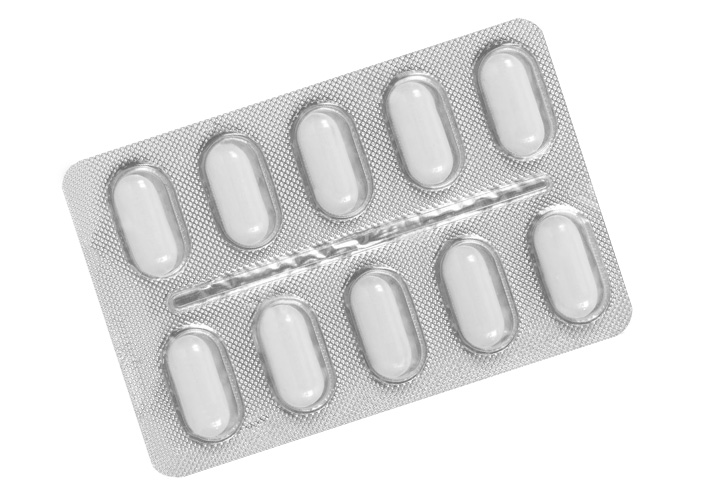Ceftin
Ceftin is an antibiotic that eliminates infectious bacterial germs. Drug is indicated for the treatment of:
- infections of the tonsils, throat, sinuses and middle ear
- worsening of chronic bronchitis
- urinary tract infections such as cystitis or pelvic kidney infections
- skin and soft tissue infections
- early-stage Lyme borreliosis.
Your doctor should test which type of bacteria is responsible for your infection and monitor its susceptibility to Ceftin during treatment.
What Does Ceftin Contain?

Active ingredients
One film-coated tablet of Ceftin 250 contains 250 mg of cefuroxime as cefuroxime axetil.
One film-coated tablet of Ceftin 500 contains 500 mg cefuroxime as cefuroxime axetil.
Excipients
Crospovidone, hydrogenated castor oil, methylcellulose, silicon dioxide hydrate, hypromellose, microcrystalline cellulose, Macrogol 8 stearate (type I), talc, titanium dioxide.
250 mg film-coated tablets:
Croscarmellose sodium 134.53 mg (12.108 mg sodium), sodium dodecyl sulphate 30.0 mg (2.393 mg sodium), one film-coated tablet contains 14.501 mg sodium.
500 mg film-coated tablets:
Croscarmellose sodium 269.06 mg (24.215 mg sodium), sodium dodecyl sulphate 60.0 mg (4.785 mg sodium), one film-coated tablet contains 29 mg sodium.
Uses
Strictly follow your doctor's instructions regarding dosage and duration of treatment. Do not under any circumstances interrupt treatment without medical authorisation.
Adults and adolescents over 12 years of age
Usual dosage: 1 film-coated tablet (250 mg) morning and evening (every 12 hours).
For certain infections (otitis media and more serious infections): 1 film-coated tablet 500 mg morning and evening (every 12 hours).
Lyme borreliosis: 500 mg 2× a day (every 12 hours) for 14 to 21 days.
Children aged 5 to 12
In children, dosage is adapted to weight and age.
Standard dosage: for most infections, the recommended dosage applies to children aged 5 years and older (with a body weight of at least 15 kg) up to 12 years of age is 10 mg/kg PC twice a day (every 12 hours) up to a maximum daily dose of 500 mg.
For the treatment of otitis media or more serious infections, the recommended dosage in children aged 5 years and over (with a body weight of at least 17 kg) is 15 mg/kg p.c. twice daily (every 12 hours) up to a maximum daily dose of 1000 mg.
Lyme borreliosis: 15 mg/kg PC 2× daily (every 12 hours) up to a maximum daily dose of 1000 mg, for 14 to 21 days.
Indication for otitis media or more serious infections or Lyme borreliosis:
(or 2 x 2 film-coated tablets 250 mg)
Children under 5 years of age
Ceftin film-coated tablets is not indicated for the treatment of children under 5 years of age.
Special dosing instructions
The doctor may prescribe a higher dose for certain infections (otitis media or more serious infections).
If you suffer from kidney disease, your doctor may prescribe a lower dose.
For these reasons, the doctor may, in some cases, prescribe a different dosage.
Correct method of administration
Ceftin film-coated tablets should be taken after a meal.
They should be swallowed with a little liquid without being chewed, because of their bitter taste.
Side Effects
Ceftin may cause the following side effects:
Common (affects 1 to 10 in 100 users)
Fungal infections (e.g. oral thrush), headache, dizziness, digestive disorders such as diarrhoea, abdominal pain and nausea.
Occasional (in 1 to 10 out of 1000 users)
Vomiting, skin rash.
Rare (affects 1 to 10 in 10,000 users)
Severe diarrhoea.
Very rare (occurs in less than 1 in 10,000 users)
Heartburn, jaundice, inflammation of the liver (hepatitis), itching, urticaria, allergic reactions up to and including anaphylactic shock. Serious skin reactions have been reported.
Changes in the number of white or red blood cells and platelets, prolonged bleeding times and changes in liver values have also been reported.
If one or more of the following symptoms occur, stop taking Ceftin and inform your doctor as soon as possible: severe nausea or diarrhoea, or severe stomach pain; rectal bleeding; development of yellow discolouration of the skin or eyes.
Problems such as difficulty in breathing, a feeling of tightness in the chest, swelling of the eyelids, face or lips, skin rash (red patches), swelling of the skin or hives (signs of a hypersensitivity/allergy reaction) should be reported immediately to your doctor, who will decide whether or not you should continue treatment with Ceftin.
In some patients treated with Ceftin for Lyme borreliosis, fever, chills, headache, muscle pain and skin rash may occur. This phenomenon is known as the Jarisch-Herxheimer reaction. Symptoms generally last from a few hours to a day.
Very rare cases of chest pain have been observed, which may be a sign of a potentially serious allergic reaction called Kounis syndrome.
Precautions
This medicine may cause dizziness and therefore affect reactions, driving ability and the ability to use tools or machines.
If you have ever had an allergic reaction to penicillin, tell your doctor; if you have a general predisposition to allergies, also tell your doctor.
If, during treatment, you notice any symptoms such as difficulty in breathing, tightness in the chest, swelling of the eyelids, face or lips, rash (red patches), swelling of the skin, urticaria, very severe diarrhoea or symptoms of hepatitis (inflammation of the liver) or jaundice (e.g. tiredness, feeling faint or faint), you should contact your doctor. If you experience symptoms of jaundice (e.g. tiredness, weakness, indisposition, loss of appetite, nausea or vomiting, yellowing of the eyes (conjunctiva), skin or discolouration of the stools), inform your doctor immediately, who will decide whether or not you should continue treatment with Ceftin.
If you suffer from diarrhoea, you must not take medicines that inhibit peristalsis (movement of the intestine).
Following the use of Ceftin, cases of particularly serious and potentially fatal skin reactions have been reported. Symptoms of these reactions include:
- flu-like symptoms and fever
- skin rash
- reactions of the mucous membranes (e.g. swelling of the mucous membranes of the mouth or throat, blistering, bleeding)
- swelling of the face or other parts of the body.
- chest pain (Kounis syndrome).
If you experience any of these symptoms after taking Ceftin, stop treatment and contact a doctor immediately.
If you suffer from impaired kidney function, tell your doctor, as the dosage of Ceftin may need to be adjusted.
Medicines used to treat overproduction of gastric acid may alter the effect of Ceftin.
If you are taking an oral contraceptive (the pill), its effectiveness may be reduced during treatment with antibiotics. This also applies to Ceftin. For this reason, additional contraceptive measures should be taken.
Please tell your doctor or pharmacist if you are taking or using any of the following medicines: strong diuretics (medicines that encourage the elimination of urine), medicines for the treatment of gout containing probenecid, medicines that reduce gastric acidity, oral contraceptives or other antibiotics (in particular those of the aminoglycoside group).
Ceftin 250 has less than 1 mmol (23 mg) of sodium per film-coated tablet, making it essentially "sodium-free."
Ceftin 500 contains 29 mg of sodium per film-coated tablet, which corresponds to 1.5% of the maximum recommended daily intake with food.
What else do you need to consider?
Remember that this medicine has been prescribed to treat your current condition. Do not use it to treat other illnesses, either your own or those of others.
The antibiotic contained in Ceftin should not be used indiscriminately against any microorganism that may cause an infection. To avoid lengthy complications resulting from the use of inadequate or incorrectly dosed anti-infective medication, Ceftin should only be used when prescribed by a doctor, even for re-infections.
Do not use this medicine after the expiry date indicated by the "EXP" label on the packaging.
After completing your treatment, return any remaining medicine to your doctor or pharmacist for proper disposal.
Additional Information
For diabetics, sugar detection in urine may result in false positives when using reduction-based copper tests (such as Fehling, Benedict, and Clinitest). Enzymatic tests are recommended instead.
If your symptoms have not significantly improved or if you do not recover after using an entire box of Ceftin, contact your doctor immediately.
For more information, please consult your doctor or pharmacist, who can provide detailed professional guidance.
When should Ceftin not be used?
Ceftin should not be taken in the event of a known or suspected allergy to cephalosporin antibiotics or to any other component of the preparation. In addition, any known or suspected allergy to penicillin or other antibiotics should be reported to the doctor. An allergy (or hypersensitivity) may manifest itself, for example, by symptoms such as skin rash, fever, respiratory distress, asthma, circulatory problems, swelling of the skin (e.g. urticaria) and mucous membranes, skin rashes or a painful tongue.
Pregnancy and Breastfeeding
Tell your doctor if you are pregnant or breast-feeding. Ceftin should only be used during pregnancy, particularly during the first trimester, for imperative reasons. Ceftin enters breast milk in small quantities.
Lyme borreliosis
Lyme disease, or Lyme borreliosis, is a tick-borne illness and the most prevalent vector-borne disease in the northern hemisphere. Its incidence is increasing globally, driven by demographic shifts and environmental changes, such as climate change.



